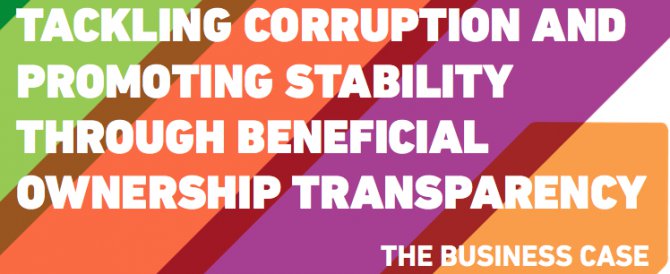At Global Witness, we’ve been making the argument for ending anonymous companies for some time. These paper companies let the criminal and corrupt get away with all sorts of crimes we are desperately trying to stop, like tax evasion, money-laundering and terrorism. It’s a global problem, one we’ve recently documented through our Great Rip Off report and online map. This is not what companies were designed for – it’s a loophole which is being abused and should be closed.
Governments are starting to recognize this – the UK recently moved to create registers of the real owners of companies, and the EU is following suit. The moves were rightly billed as a crackdown on corporate secrecy and organized crime.
Now, the economic argument is being made too, and importantly not just by us campaigners. It’s being articulated by the people who know best, at the business world’s annual gala event in Davos, Switzerland.

A group of business leaders known as The B-Team , founded by Richard Branson (Virgin Group’s Founder and CEO) and Jochen Zeitz (former CEO of Puma), has recently come together to marry business goals with social progress on critical issues like climate change and poverty. Another of the group’s key planks is the effort to ‘drive transparency’ and curb corruption. And in a report released this week, The B-Team has set out the ‘business case’ for beneficial ownership transparency, drawing on some powerful economic arguments.
The B-Team says that not only does corruption undermine democratic government and efforts to fight poverty, it amounts to a colossal 10% ‘tax’ that is a hidden cost of doing business globally. This isn’t about corruption ‘over there’, either. The report cites a recent OECD study of 427 foreign bribery cases since 1999, which found that almost half of those cases involved bribery of public officials from developed countries, while over half of the cases also involved corporate management or CEOs, not lower-level employees.
The overall message of the report is clear – coming clean about who owns companies makes business sense for a number of reasons:
- Increase Competitiveness: Corruption enabled by anonymous companies can distort markets and deplete public monies that otherwise drive economic development. Company ownership transparency would help level the playing field by making sure the same rules apply to all companies, not just the powerful or politically connected ones.
- Reduce Risk: Knowing who you are doing business with can reduce due diligence costs and ultimately prevent misallocation of capital. It can also reduce the legal costs and liabilities a company could incur if they unknowingly do business with people subject to sanctions or anti-corruption statutes.
- Managing financial exposure and increasing stability: During the 2009 financial crisis, a number of companies had trouble determining what risks they incurred due to collapsing investment banks, because the complex web of corporate ownership structure propping up their investments was too difficult untangle. Ownership disclosure would help manage risk and foster stability, which in turn would help financial markets.
- Reducing impunity: Arguably, the strongest incentive to engage in corruption is the knowledge you can get away with it. According to a 2011 United Nations Office on Drugs and Crime (UNODC) report, global detection rates of the movement of illicit funds are abysmal, estimated to be as low as 1 per cent for criminal proceeds, while the seizure rate is thought to be even lower, at 0.2 percent. Impunity hurts business and fosters distrust of business and governments alike. Coming clean on company ownership could turn this tide.
The B-Team’s support comes at a critical moment. G20 nations recently adopted new standards supporting beneficial ownership transparency. The new EU anti-money laundering directive rules will soon require EU member states to collect companies’ beneficial ownership information in registries. Some European states, such as the UK and Sweden, have plans to make those registries open to the public. But, the U.S. still needs to take steps to catch up with its global counterparts. And, in all these countries, much work is still needed to ensure these new measures are implemented quickly and effectively.
Business support will be critical in turning the tide so that transparency is the norm. The path forward will be a challenging one, but the status quo isn’t working for business or society, and it needs to change. After all, are the gains that a small few receive from the abuse of anonymous companies worth the widespread risk, the harm, instability they can inflict on all of us?
We don’t think so, but don’t just take it from us. In a Guardian opinion piece this week, telecom entrepreneur, B-Team Leader and anti-corruption advocate Mo Ibrahim asserts that, “Ethical and effective businesses do not require anonymous companies to operate and succeed, yet such businesses may suffer the consequences of their use…. For me, the case against anonymous companies is very simple. If you are successful in business you do not need them, and they have no economic or social purpose.”
Hear hear.
Mark Hays is a Senior Advisor on the Money Laundering campaign at Global Witness